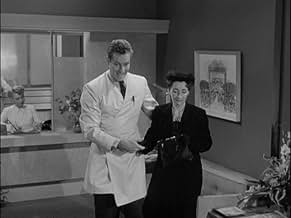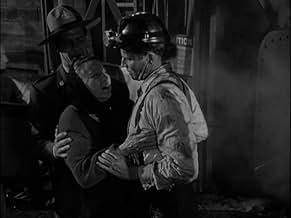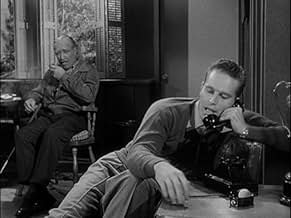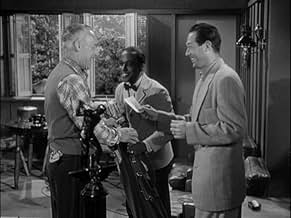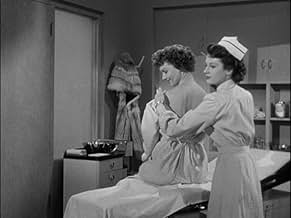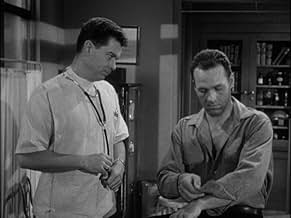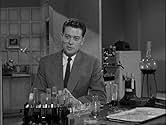AVALIAÇÃO DA IMDb
5,8/10
1,1 mil
SUA AVALIAÇÃO
Adicionar um enredo no seu idiomaA doctor returning from the Korean War to his hometown in Pennsylvania must choose what next to do with his life.A doctor returning from the Korean War to his hometown in Pennsylvania must choose what next to do with his life.A doctor returning from the Korean War to his hometown in Pennsylvania must choose what next to do with his life.
- Direção
- Roteiristas
- Artistas
Philip Ahlm
- Minor Role
- (não creditado)
Elsie Baker
- Mrs. Olzoneski
- (não creditado)
Mary Benoit
- Party Guest
- (não creditado)
Avaliações em destaque
A freshly discharged army doctor passes up practice in blue-collar hometown for big- paying practice among a city elite that includes a cool blonde dilettante.
I got this epic as part of a package claiming to be all noir. The only thing noir in this movie are the several night time shots— otherwise, no crime, no hand of fate, and no moody atmosphere. Only blonde seductress Helen (Scott) instead, and she's hardly the standard spider woman. Actually, the movie's more b&w soap opera than anything else.
That's not to say there're no redeeming features. I guess I wasn't aware of what a racket doctoring among the wealthy can be. The movie shows what a cushy pandering job it can be, treating headaches with high-priced medicines and smarmy words. And coming from a muckraker like novelist McCoy, e.g. They Shoot Horses Don't They (1969), I take it as factually based.
And surprise, surprise, to me, at least—actor Heston is quite animated as the sell-out doctor. I guess this was before he stiffened into a big-screen movie god, but whatever, he's quite persuasive in the role. Still, I thought the script made the doc's transition from honorable soldier to money-grubbing pill pusher much too easy, more like a movie device than a character change. Nonetheless, get a load of the coal mine scenes, quite realistic and well done.
But, bottom line, the story follows a familiar pattern with no surprises, suggesting a production serving mainly as a vehicle for Columbia's newest hunk.
I got this epic as part of a package claiming to be all noir. The only thing noir in this movie are the several night time shots— otherwise, no crime, no hand of fate, and no moody atmosphere. Only blonde seductress Helen (Scott) instead, and she's hardly the standard spider woman. Actually, the movie's more b&w soap opera than anything else.
That's not to say there're no redeeming features. I guess I wasn't aware of what a racket doctoring among the wealthy can be. The movie shows what a cushy pandering job it can be, treating headaches with high-priced medicines and smarmy words. And coming from a muckraker like novelist McCoy, e.g. They Shoot Horses Don't They (1969), I take it as factually based.
And surprise, surprise, to me, at least—actor Heston is quite animated as the sell-out doctor. I guess this was before he stiffened into a big-screen movie god, but whatever, he's quite persuasive in the role. Still, I thought the script made the doc's transition from honorable soldier to money-grubbing pill pusher much too easy, more like a movie device than a character change. Nonetheless, get a load of the coal mine scenes, quite realistic and well done.
But, bottom line, the story follows a familiar pattern with no surprises, suggesting a production serving mainly as a vehicle for Columbia's newest hunk.
Charlton Heston ("Col. Owen") returns from almost ten years as an army surgeon to his Pennsylvania home to find that his dead brother has been accused of sloppy practices that caused fatalities at a coal mine. His mother (Mildred Dunnock) and local doctor "Scobee" (Rhys Williams) hope he will stay and help the local community, but he discovers that his late brother had run up quite a bit of debt and determines to pay it back. A chance meeting with the "Helen" (Lizabeth Scott) - the daughter of the man who holds the debt - introduces him to new opportunities. She is wealthy, twice divorced, and well connected. His quick thinking after an incident at a party sees an association with prominent, and rather venal, doctor "Gleeson" (Lester Matthews) offer him a route to success and prosperity. Along the way, he proposes to "Helen" and all looks set fair. Much of this film takes a swipe at the hypochondriac patients - mostly wealthy women - and at the physicians who are little better than charlatans; charging a small fortune for glorified Alka Seltzer. Will "Owen" continue to be satisfied with this increasingly unfulfilling existence or will his innate instincts developed during wartime send him back to tend to the more legitimate and urgent needs of the community at large? Heston is a bit on the wooden side here, he delivers his dialogue rather stiltedly and without much passion. Scott is adequate - but more as an effective conduit for the decisions the doctor might make, and there is a decent, if sparing, contribution from Dianne Foster as the voice of reason in the man's increasingly conflicted life - and not just professionally, either. It's way too wordy but it does offer food for thought about practices that probably still exist today and is a bit better than I was expecting.
Army surgeon Charlton Heston is happy with his work, but a visit home to the coal-mining town he was born in,as well as society vamp Lizabeth Scott, make him think there's more to life than patching up wounded soldiers. At first he's interested in serving the poor people he grew up with. However Miss Scott gets him a job with society doctor Lester Matthews and becomes engaged to him. He finds his practice consists largely of giving nostrums to wealthy women at $250 a visit. Finally his nurse, Dianne Foster, leaves him to assist Dr. Arthur Franz, who's taking care of the miners and their families. His crisis of faith, however, is yet to come.
Heston has already developed his deep-throated growl in this movie, although he has not perfected it. It has a quality to it that I think is supposed to denote dissatisfaction, but sounds whiny to me. In a world where everyone else struggles for status and wealth, it's up to the woman at the top of both trees to point out the necessity of honesty and honor; well, she's the only one who can.
Heston has already developed his deep-throated growl in this movie, although he has not perfected it. It has a quality to it that I think is supposed to denote dissatisfaction, but sounds whiny to me. In a world where everyone else struggles for status and wealth, it's up to the woman at the top of both trees to point out the necessity of honesty and honor; well, she's the only one who can.
Bad for Each Other (1953)
Charlton Heston gets a bad rap sometimes--maybe that's what you expect after "Planet of the Apes"--but here he is the charming, confident, larger than life young man that made him famous. Yes, it's a B-movie, but it's a very strong performance for Heston and he is surrounded by a cast that is decent (Lizabeth Scott not at her best, which is saying a lot) to terrific (Ray Collins as the big business power guy he plays so well). The "business" at the center is a coal mine in a small Pennsylvania town, and Heston plays a doctor, Tom Owen, getting out of the military in a pseudo-noir kind of echo. Owen's dilemma is a worldly one--whether to doctor rich old women with frivolous pains or to work for the miners in their lower class afflictions.
And it is Lizabeth Scott, a pampered (and unabashedly pampered) rich girl who snags our hero, and so against his initial instinct Heston goes the rich and lazy way. But of course the coal mining town is all around him, and reminders pop up now and then. It's a great problem for a movie, and it's worked out with fairly predictable logic, so there is nothing to really fault here. Except that very predictability. Even Scott is a bit bland, not really getting to run her coolness to true ice. Some of the side characters are well developed, surprisingly (a "good" doctor untainted by money and an old woman who is wiser than she lets on at first), and director Irving Rapper (who should have been a music star in the 1990s with a name like that) makes it pop pretty well.
The less than sterling reputation of this movie is unwarranted, but it may be a result of higher expectations than this kind of movie deserves. Yes, the plot is boilerplate stuff, but so are half the movie plots out there. And Heston is sort of terrific. Yes, he plays a type, and he doesn't give the angst some other actor might, but I don't think the character, Dr. Owen, was an angst-y kind of guy. The way he wrestles with things is believable.
The cinematography by Franz Planer is better than I'd expected (the name didn't ring a bell) and there are small sterling moments, the camera moving around a group of people at a table, or across a wrought iron screen as the two leads start to hit it off. Nice stuff. The title is wrong, by the way--it's only Scott's character who is bad for the doctor, not the other way around. She's not about to be affected by anyone, especially a handsome young ex-GI who is such easy prey.
Charlton Heston gets a bad rap sometimes--maybe that's what you expect after "Planet of the Apes"--but here he is the charming, confident, larger than life young man that made him famous. Yes, it's a B-movie, but it's a very strong performance for Heston and he is surrounded by a cast that is decent (Lizabeth Scott not at her best, which is saying a lot) to terrific (Ray Collins as the big business power guy he plays so well). The "business" at the center is a coal mine in a small Pennsylvania town, and Heston plays a doctor, Tom Owen, getting out of the military in a pseudo-noir kind of echo. Owen's dilemma is a worldly one--whether to doctor rich old women with frivolous pains or to work for the miners in their lower class afflictions.
And it is Lizabeth Scott, a pampered (and unabashedly pampered) rich girl who snags our hero, and so against his initial instinct Heston goes the rich and lazy way. But of course the coal mining town is all around him, and reminders pop up now and then. It's a great problem for a movie, and it's worked out with fairly predictable logic, so there is nothing to really fault here. Except that very predictability. Even Scott is a bit bland, not really getting to run her coolness to true ice. Some of the side characters are well developed, surprisingly (a "good" doctor untainted by money and an old woman who is wiser than she lets on at first), and director Irving Rapper (who should have been a music star in the 1990s with a name like that) makes it pop pretty well.
The less than sterling reputation of this movie is unwarranted, but it may be a result of higher expectations than this kind of movie deserves. Yes, the plot is boilerplate stuff, but so are half the movie plots out there. And Heston is sort of terrific. Yes, he plays a type, and he doesn't give the angst some other actor might, but I don't think the character, Dr. Owen, was an angst-y kind of guy. The way he wrestles with things is believable.
The cinematography by Franz Planer is better than I'd expected (the name didn't ring a bell) and there are small sterling moments, the camera moving around a group of people at a table, or across a wrought iron screen as the two leads start to hit it off. Nice stuff. The title is wrong, by the way--it's only Scott's character who is bad for the doctor, not the other way around. She's not about to be affected by anyone, especially a handsome young ex-GI who is such easy prey.
Charlton Heston and Lizabeth Scott are "Bad for Each Other" in this predictable 1953 film, also starring Mildred Dunnock, Arthur Franz, Marjorie Rambeau, and Dianne Foster.
Heston plays a doctor who returns from the service to the coal town where he grew up. After meeting the wealthy, twice-married, shallow Scott, he decides not to stay in the service and becomes a society doctor, in it for the money. The nurse he hires to work for him (Foster) thinks he's better than that.
The role played by Arthur Franz, that of a young doctor who admires him and doesn't mind going into the trenches, is essentially Heston's conscience.
I found this film pretty bland, but the big problem for me was that the main character as portrayed by Heston was just not likable. He wasn't likable before he took up with Scott nor was he likable throughout the film. Some of this was in the script, but some of it was in his line readings. He had fat attitude every time he opened his mouth. Frankly I didn't care what he did.
Lizabeth Scott was best earlier in her career, in her noir days, where her great voice, sexy blond looks, and ambiguous performances fit very well. Her character in this also was annoying. Now, she's not supposed to be likable, but we should have been able to see why Heston liked her. She seemed awfully pushy for his character to have put up with her.
Heston was tall, handsome, with a great voice and a dominating presence. This film was unfortunately directed in a somewhat old-fashioned manner so as to seem melodramatic and over the top. When someone with that strong a screen persona is directed that way, his performance becomes too actor-y.
Nothing special.
Heston plays a doctor who returns from the service to the coal town where he grew up. After meeting the wealthy, twice-married, shallow Scott, he decides not to stay in the service and becomes a society doctor, in it for the money. The nurse he hires to work for him (Foster) thinks he's better than that.
The role played by Arthur Franz, that of a young doctor who admires him and doesn't mind going into the trenches, is essentially Heston's conscience.
I found this film pretty bland, but the big problem for me was that the main character as portrayed by Heston was just not likable. He wasn't likable before he took up with Scott nor was he likable throughout the film. Some of this was in the script, but some of it was in his line readings. He had fat attitude every time he opened his mouth. Frankly I didn't care what he did.
Lizabeth Scott was best earlier in her career, in her noir days, where her great voice, sexy blond looks, and ambiguous performances fit very well. Her character in this also was annoying. Now, she's not supposed to be likable, but we should have been able to see why Heston liked her. She seemed awfully pushy for his character to have put up with her.
Heston was tall, handsome, with a great voice and a dominating presence. This film was unfortunately directed in a somewhat old-fashioned manner so as to seem melodramatic and over the top. When someone with that strong a screen persona is directed that way, his performance becomes too actor-y.
Nothing special.
Você sabia?
- CuriosidadesAccording to December 1950 articles in The Hollywood Reporter and the Los Angeles Times, producer Hal B. Wallis purchased the rights to the novel before it was published for $100,000 ($1.3M in 2024). Wallis intended the leads to be Burt Lancaster and Patricia Neal and that the project was to be filmed at Paramount. It never got off the ground, and Wallis ended up selling the rights to Columbia in early 1953.
- Erros de gravaçãoThe beginning scenes of movie show coal mine operations in Coalville, PA. The railroad caboose was from ATSF (Atchison, Topeka, and Santa Fe). That railroad never had operations in Pennsylvania.
- Citações
Dr. Tom Owen: [on the phone with his wife] Oh, I'm interviewing nurses, of course... Don't be silly, darling - of course she'll be fat and ugly. I do insist on good legs, though.
Principais escolhas
Faça login para avaliar e ver a lista de recomendações personalizadas
- How long is Bad for Each Other?Fornecido pela Alexa
Detalhes
- Tempo de duração
- 1 h 23 min(83 min)
- Cor
Contribua para esta página
Sugerir uma alteração ou adicionar conteúdo ausente

